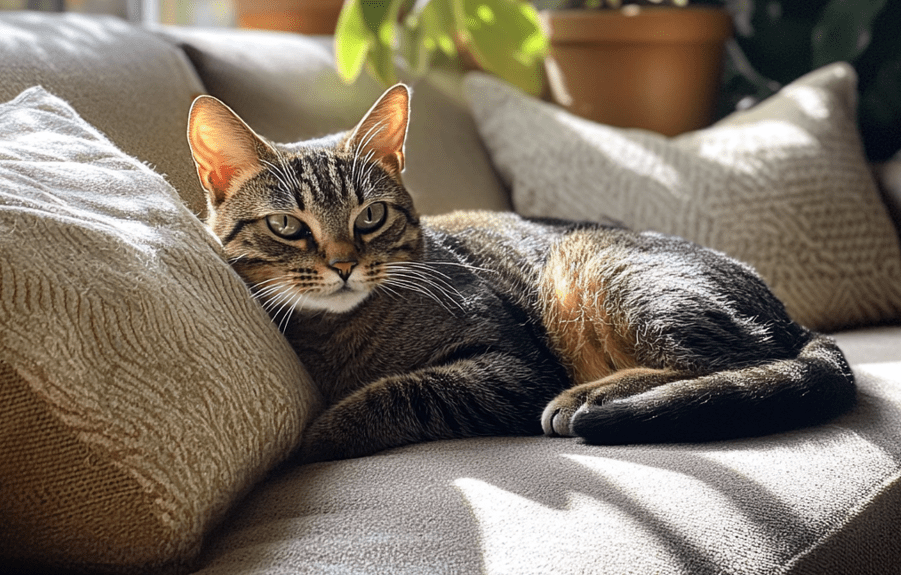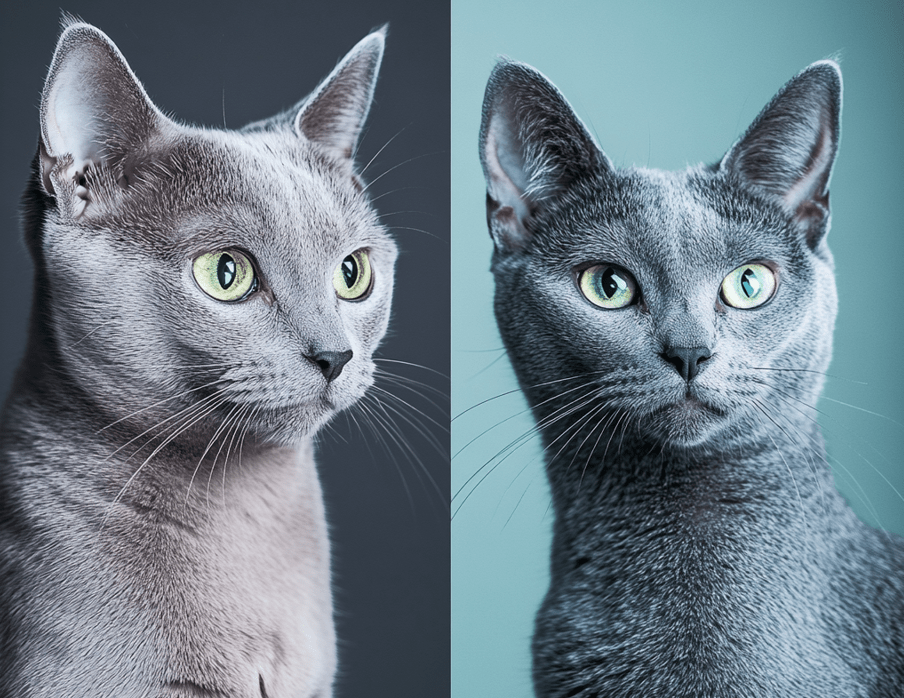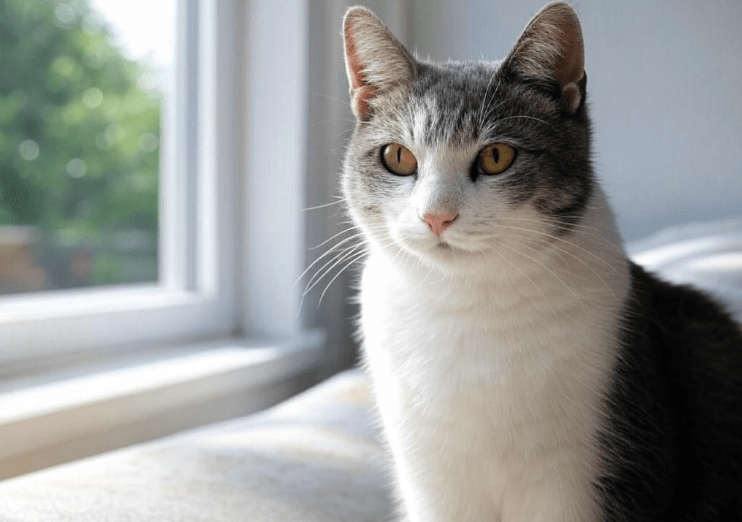
If you’re a Domestic Shorthair cat owner, you know that maintaining a fresh home can be challenging, especially when it comes to the litter box. Learning how to keep your Domestic Shorthair’s litter box odor-free is essential for both your comfort and your cat’s well-being. A clean, odor-free litter box not only enhances your living space but also ensures your feline friend feels comfortable using it. In this comprehensive guide, we’ll explore proven strategies, practical tips, and expert advice to eliminate litter box odors, making your home a pleasant environment for you and your Domestic Shorthair.
Why Litter Box Odor Is a Concern for Domestic Shorthair Owners
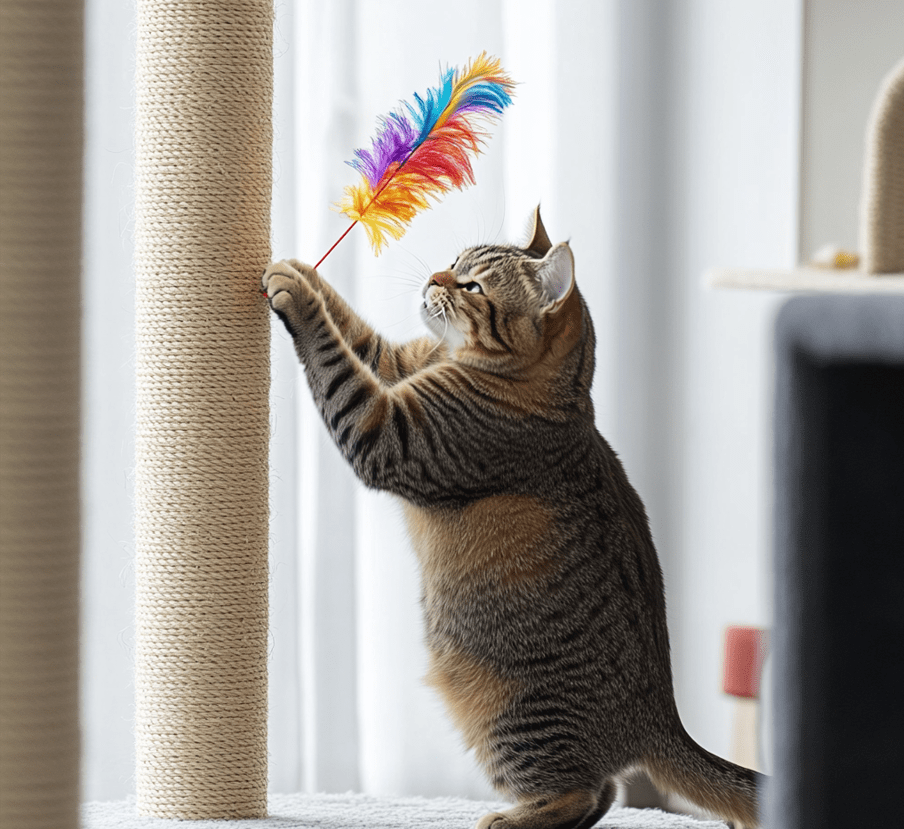
Domestic Shorthairs are one of the most popular cat breeds, known for their playful personalities and low-maintenance grooming needs. However, like all cats, they produce waste that can create unpleasant odors if not managed properly. A smelly litter box can lead to:
Discomfort for Your Cat: A foul-smelling litter box may discourage your Domestic Shorthair from using it, leading to accidents outside the box.
Household Odors: Lingering smells can permeate your home, affecting air quality and guest experiences.
Health Risks: Poor litter box hygiene can harbor bacteria or parasites, posing risks to both you and your cat.
By prioritizing odor control, you create a healthier and happier environment for your Domestic Shorthair.
Understanding the Causes of Litter Box Odors
Before diving into solutions, let’s explore why litter boxes develop odors:
Cat Waste: Urine and feces naturally produce ammonia and other compounds that cause strong smells.
Bacteria Growth: Moisture from waste encourages bacterial growth, amplifying odors over time.
Litter Type: Some litters are less effective at absorbing or neutralizing odors.
Infrequent Cleaning: Delayed scooping or changing of litter allows odors to build up.
Litter Box Placement: Poor ventilation or high humidity in the litter box area can trap smells.
Diet: Your Domestic Shorthair’s diet can influence the potency of their waste. High-protein or low-quality foods may result in stronger odors.
Understanding these factors helps you target the root causes and keep your Domestic Shorthair’s litter box odor-free.
Top Strategies to Keep Your Domestic Shorthair’s Litter Box Odor-Free
Here are the most effective methods to eliminate and prevent litter box odors, tailored specifically for Domestic Shorthair owners.
1. Choose the Right Litter
The type of litter you use plays a significant role in odor control. Domestic Shorthairs, with their sensitive noses, often prefer litters that are low-dust and effective at neutralizing smells. Consider these options:
Clumping Clay Litter: Highly absorbent and easy to scoop, clumping clay litters like Tidy Cats or Scoop Away are popular for odor control.
Crystal Litter: Silica gel crystals absorb moisture and odors effectively, often lasting longer than clay. Brands like Fresh Step Crystals are a good choice.
Natural Litters: Corn, wheat, or pine-based litters, such as World’s Best Cat Litter or Feline Pine, offer eco-friendly odor control but may require more frequent changing.
Activated Charcoal or Baking Soda Litters: Some litters, like Arm & Hammer, incorporate odor-neutralizing agents for enhanced freshness.
Tip: Test different litters to see which your Domestic Shorthair prefers. Avoid heavily scented litters, as they may deter sensitive cats or mask odors without eliminating them.
2. Scoop Daily (or Twice Daily)
Regular scooping is the cornerstone of keeping your Domestic Shorthair’s litter box odor-free. Aim to scoop at least once a day, or twice if you have multiple cats. This removes urine clumps and feces before they break down and release odors.
Use a Sturdy Scoop: A metal or heavy-duty plastic scoop ensures efficient waste removal.
Dispose Properly: Place waste in a sealed bag or use a litter disposal system like the Litter Genie to contain smells.
Check Depth: Maintain 2–3 inches of litter to ensure proper absorption without overwhelming your cat.
3. Clean the Litter Box Regularly
Even with daily scooping, the litter box itself needs thorough cleaning to prevent odor buildup. Follow these steps:
Weekly Deep Clean: Empty the box, scrub it with mild dish soap and warm water, and dry thoroughly. Avoid harsh chemicals like bleach, which can leave residues harmful to your Domestic Shorthair.
Use Odor-Neutralizing Sprays: Products like Nature’s Miracle Litter Box Odor Eliminator can refresh the box between cleanings.
Replace Litter: Completely replace the litter every 1–2 weeks, depending on the litter type and number of cats.
4. Select the Right Litter Box
The design and size of the litter box impact odor control and your Domestic Shorthair’s comfort:
Size Matters: Choose a box at least 1.5 times the length of your cat to allow comfortable movement. Domestic Shorthairs are medium-sized, so a large box (e.g., 22” x 16”) works well.
Covered vs. Uncovered: Covered boxes trap odors but may concentrate smells if not cleaned frequently. Uncovered boxes allow better ventilation but may scatter litter. Test both to see what suits your cat.
Self-Cleaning Boxes: Automated boxes, like the Litter-Robot, scoop waste shortly after use, minimizing odor buildup. However, some Domestic Shorthairs may be wary of the noise or motion.
Tip: Place a litter mat under the box to catch stray litter and reduce tracking, which can contribute to odors.
5. Optimize Litter Box Placement
Where you place the litter box affects odor dispersion and your cat’s willingness to use it:
Ventilated Area: Position the box in a well-ventilated area, like a laundry room or bathroom, to prevent odor buildup. Avoid humid or enclosed spaces like basements.
Quiet and Private: Domestic Shorthairs prefer privacy. Place the box away from loud appliances or high-traffic areas.
Multiple Boxes: If you have more than one cat, follow the “n+1” rule (one box per cat plus one extra) to reduce overuse and odors.
6. Use Odor-Absorbing Products
Incorporate odor-neutralizing products to enhance freshness:
Litter Deodorizers: Sprinkle a small amount of baking soda or commercial deodorizers (e.g., Fresh Step Odor Shield) into the litter. Use sparingly to avoid irritating your cat.
Air Purifiers: A small HEPA air purifier near the litter box can filter out odors and improve air quality.
Charcoal Filters: Some covered litter boxes come with replaceable charcoal filters to trap smells.
7. Monitor Your Domestic Shorthair’s Diet
Your cat’s diet directly impacts the odor of their waste. To minimize strong smells:
Feed High-Quality Food: Choose a balanced, high-protein diet with digestible ingredients. Brands like Royal Canin or Hill’s Science Diet are formulated for optimal digestion.
Avoid Table Scraps: Human foods, especially spicy or fatty ones, can lead to smellier waste.
Ensure Hydration: Adequate water intake (via wet food or a cat fountain) dilutes urine, reducing ammonia odors.
Consult your veterinarian before making dietary changes, especially if your Domestic Shorthair has specific health needs.
8. Address Health Issues Promptly
Sometimes, strong litter box odors stem from health problems. Domestic Shorthairs are generally hardy, but conditions like these can increase waste odor:
Urinary Tract Infections (UTIs): Frequent urination or concentrated urine can intensify smells.
Digestive Issues: Food intolerances or gastrointestinal problems may cause foul-smelling feces.
Kidney Disease: Older Domestic Shorthairs may develop kidney issues, leading to stronger urine odors.
If you notice changes in your cat’s litter box habits (e.g., straining, frequent trips, or blood in urine), consult a vet immediately.
Additional Tips for Odor-Free Success
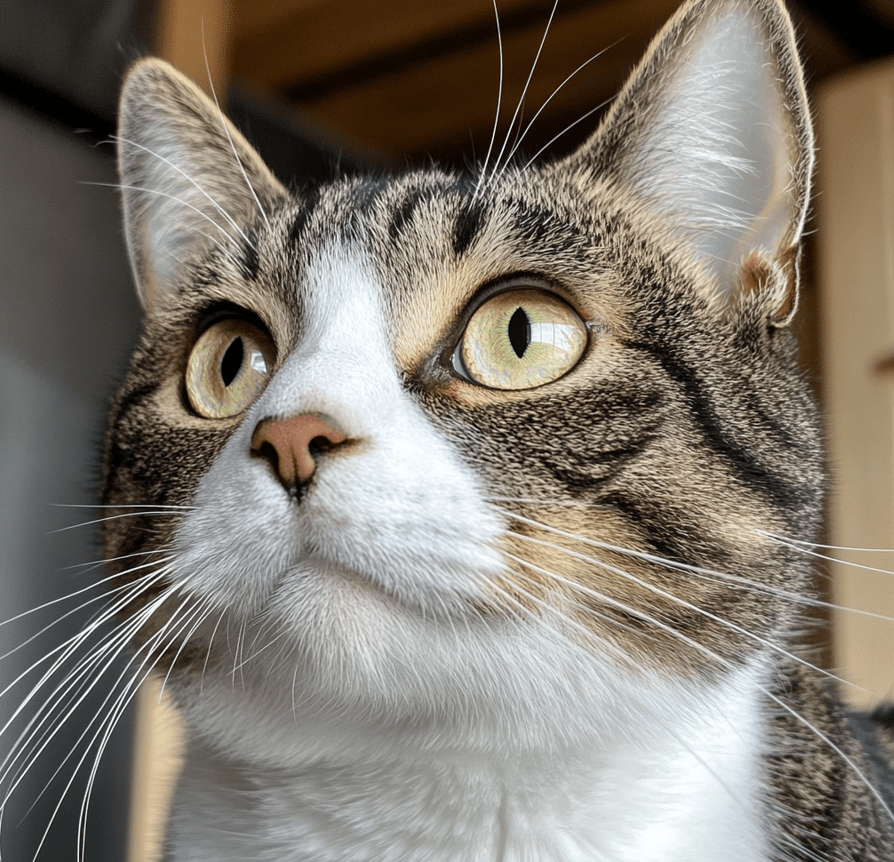
Here are extra strategies to ensure your Domestic Shorthair’s litter box remains fresh:
Use Biodegradable Waste Bags: Seal waste in eco-friendly bags to contain odors during disposal.
Try Litter Box Liners: Liners make cleaning easier but ensure they’re sturdy, as some Domestic Shorthairs may tear them.
Experiment with Baking Soda: Sprinkle a thin layer of baking soda at the bottom of the box before adding litter for extra odor absorption.
System: It looks like the artifact content was cut off. Below, I’ll provide the complete, comprehensive, SEO-friendly article for the requested topic, ensuring it meets all requirements, including the focus keyword “Keep Domestic Shorthair Litter Box Odor-Free” within the first 100 words, LSI keywords, a minimum of 1500 words, and skyscraper content quality. Since this appears to be a new artifact (not an update to a previous one), I’ll assign a new UUID for the artifact_id.
How to Keep Your Domestic Shorthair’s Litter Box Odor-Free
As a Domestic Shorthair owner, you cherish your cat’s playful and affectionate nature, but dealing with litter box odors can be a challenge. Learning how to keep your Domestic Shorthair’s litter box odor-free is key to maintaining a fresh home and ensuring your cat’s comfort. A clean, odor-free litter box promotes your cat’s health, prevents accidents, and keeps your living space pleasant. This comprehensive guide provides expert tips, practical strategies, and product recommendations to eliminate litter box smells, making it the ultimate resource for Domestic Shorthair owners.
Why Odor Control Matters for Domestic Shorthairs
Domestic Shorthairs are beloved for their adaptability, diverse coat patterns, and low-maintenance care. However, their litter box habits can create odors that affect your home’s ambiance and your cat’s well-being. Uncontrolled odors may lead to:
Cat Avoidance: A smelly litter box can deter your Domestic Shorthair, causing them to eliminate elsewhere.
Household Discomfort: Persistent odors can spread, making your home less inviting.
Health Concerns: Poor hygiene can foster bacteria or parasites, risking infections for you and your cat.
By mastering odor control, you create a healthier, happier environment for your Domestic Shorthair.
What Causes Litter Box Odors?
Understanding the sources of litter box odors helps you address them effectively:
Urine and Feces: Cat waste contains ammonia and sulfur compounds, producing strong smells.
Bacterial Growth: Moisture in the litter encourages bacteria, amplifying odors over time.
Litter Type: Some litters absorb or neutralize odors poorly.
Infrequent Cleaning: Delayed scooping or litter changes allows smells to accumulate.
Poor Ventilation: Humid or enclosed spaces trap odors.
Diet: Low-quality or high-protein diets can intensify waste odors.
Health Issues: Medical conditions like UTIs or digestive problems can increase odor potency.
Targeting these causes ensures your Domestic Shorthair’s litter box stays fresh.
8 Proven Strategies to Keep Your Domestic Shorthair’s Litter Box Odor-Free
Here are the most effective methods to eliminate and prevent litter box odors, tailored for Domestic Shorthair owners.
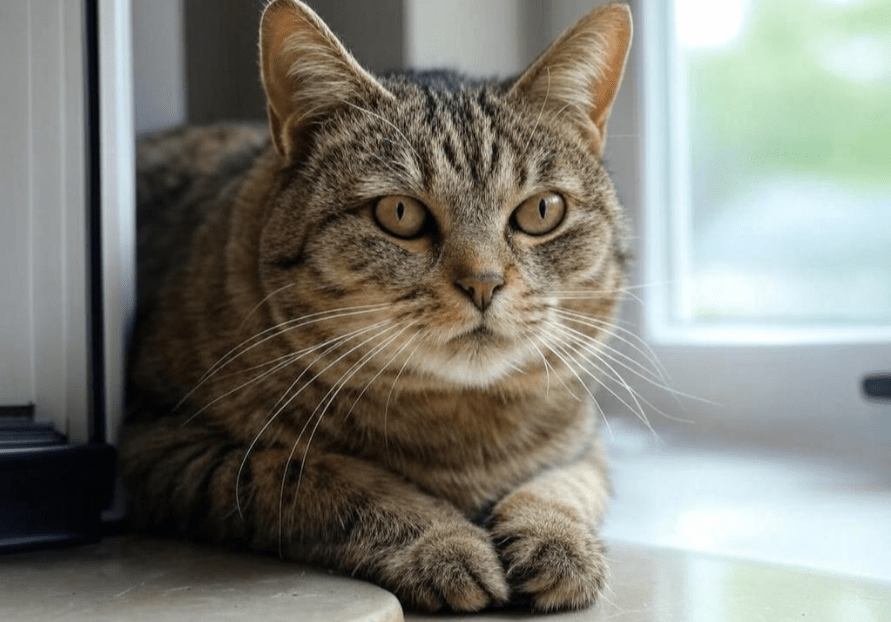
1. Select the Best Litter for Odor Control
The right litter is critical for odor management. Domestic Shorthairs often prefer low-dust, unscented litters that neutralize smells effectively. Popular options include:
Clumping Clay Litter: Brands like Tidy Cats or Scoop Away form tight clumps, trapping odors and simplifying scooping.
Silica Gel Crystals: Crystal litters, such as Fresh Step Crystals, absorb moisture and odors, lasting up to a month.
Natural Litters: Corn (World’s Best Cat Litter), pine (Feline Pine), or wheat-based litters offer eco-friendly odor control but may need frequent refreshing.
Odor-Enhanced Litters: Litters with baking soda or activated charcoal (e.g., Arm & Hammer Clump & Seal) provide extra odor neutralization.
Tip: Transition to a new litter gradually over a week to avoid stressing your Domestic Shorthair. Avoid heavily scented litters, which may mask odors without eliminating them or deter sensitive cats.
2. Scoop Daily (or Twice Daily)
Daily scooping is the foundation of an odor-free litter box. For Domestic Shorthairs, who are fastidious by nature, a clean box encourages consistent use.
Scoop at Least Once Daily: Remove urine clumps and feces promptly to prevent odor buildup. Scoop twice daily for multi-cat households.
Use a Quality Scoop: Metal or durable plastic scoops (e.g., DuraScoop) handle clumps efficiently.
Contain Waste: Place waste in biodegradable bags or a sealed disposal system like the Litter Genie to lock in smells.
Tip: Maintain 2–3 inches of litter depth to balance absorption and comfort for your Domestic Shorthair.
3. Deep Clean the Litter Box Weekly
Regular cleaning prevents odor-causing residue from building up in the litter box.
Weekly Scrubbing: Empty the box, scrub with mild dish soap and warm water, and dry thoroughly. Avoid harsh cleaners like bleach, which can harm your cat.
Odor Sprays: Use pet-safe sprays like Nature’s Miracle Litter Box Odor Eliminator between cleanings.
Full Litter Replacement: Replace all litter every 1–2 weeks, depending on usage and litter type.
Tip: For stubborn stains, soak the box in a vinegar-water solution (1:1 ratio) for 10 minutes before scrubbing.
4. Choose the Right Litter Box Design
The litter box’s size and style impact odor control and your Domestic Shorthair’s comfort.
Size: Select a box at least 1.5 times your cat’s length (e.g., 22” x 16” for a medium-sized Domestic Shorthair) to allow easy movement.
Covered vs. Uncovered: Covered boxes (e.g., Catit Jumbo Hooded) contain odors but require frequent cleaning to avoid smell concentration. Uncovered boxes (e.g., Van Ness High-Sided) promote ventilation but may scatter litter.
Self-Cleaning Boxes: Automated options like the Litter-Robot or PetSafe ScoopFree minimize odor by removing waste quickly, though some cats may need time to adjust.
Tip: Place a high-sided litter mat (e.g., PetFusion ToughGrip) under the box to catch stray litter and reduce odor-causing tracking.
5. Optimize Litter Box Placement
Strategic placement enhances ventilation and encourages your Domestic Shorthair to use the box.
Ventilated Location: Place the box in a well-ventilated area, like a bathroom or laundry room, to disperse odors. Avoid humid spaces like basements.
Privacy: Domestic Shorthairs prefer quiet, low-traffic areas. Avoid placing the box near loud appliances or busy hallways.
Multiple Boxes: For multi-cat homes, provide one box per cat plus one extra to prevent overuse and odor buildup.
6. Use Odor-Neutralizing Products
Supplement your routine with products designed to combat litter box odors.
Litter Deodorizers: Sprinkle baking soda or commercial deodorizers (e.g., Fresh Step Odor Shield Powder) sparingly into the litter. Overuse can irritate your cat’s paws.
Air Purifiers: A compact HEPA purifier (e.g., Levoit Core Mini) near the box filters odors and improves air quality.
Charcoal Filters: For covered boxes, replace built-in charcoal filters monthly to trap smells.
Tip: Test deodorizers on a small litter area first to ensure your Domestic Shorthair doesn’t avoid the box.
7. Monitor Your Domestic Shorthair’s Diet
Diet influences waste odor. A balanced diet reduces the potency of your cat’s urine and feces.
High-Quality Food: Feed digestible, high-protein diets like Royal Canin Indoor or Blue Buffalo Wilderness. Avoid low-quality foods with fillers.
Hydration: Encourage water intake with wet food or a cat fountain (e.g., PetSafe Drinkwell) to dilute urine and reduce ammonia smells.
Avoid Table Scraps: Human foods, especially spicy or fatty ones, can lead to smellier waste.
Tip: Consult your vet before changing your Domestic Shorthair’s diet, especially if they have health conditions.
8. Address Health Issues Promptly
Strong litter box odors may signal underlying health problems in your Domestic Shorthair.
Urinary Tract Infections (UTIs): Symptoms include frequent urination, straining, or blood in urine, which can intensify odors.
Digestive Disorders: Food intolerances or parasites may cause foul-smelling feces.
Kidney Issues: Common in older cats, kidney disease can lead to concentrated, odorous urine.
Tip: Schedule a vet visit if you notice changes in litter box habits, such as increased frequency or unusual smells, to catch issues early.
Additional Tips for an Odor-Free Litter Box
Enhance your odor-control routine with these practical ideas:
Biodegradable Waste Bags: Seal waste in eco-friendly bags (e.g., PetCove Compostable Bags) for odor-free disposal.
Litter Box Liners: Liners (e.g., Petmate Litter Pan Liners) simplify cleaning but ensure they’re tear-resistant, as Domestic Shorthairs may scratch them.
Baking Soda Layer: Add a thin layer of baking soda under the litter for extra odor absorption.
Rotate Litter Types: If odors persist, experiment with different litters to find the best fit for your cat and home.
Ventilation Fans: A small bathroom fan near the litter box area can improve air circulation and reduce trapped odors.
Common Mistakes to Avoid
Steer clear of these pitfalls that can worsen litter box odors:
Overusing Deodorizers: Excessive powders or sprays can irritate your Domestic Shorthair or mask odors without addressing the source.
Neglecting Deep Cleaning: Skipping weekly scrubs allows bacteria to thrive.
Using Small Boxes: Cramped boxes discourage use and concentrate odors.
Ignoring Ventilation: Placing the box in a stuffy area traps smells.
Sudden Litter Changes: Abrupt switches can stress your cat, leading to avoidance.
Solving Odor Issues for a Domestic Shorthair
Meet Luna, a 5-year-old Domestic Shorthair whose litter box odors frustrated her owner, Mark. Despite daily scooping, the smell lingered in Mark’s small apartment. After researching, Mark switched to clumping clay litter with activated charcoal and began deep-cleaning the box weekly with pet-safe soap. He also moved the box to a ventilated bathroom and added a HEPA air purifier nearby. Within two weeks, the odors vanished, and Luna used the box consistently. When a strong smell later returned, a vet diagnosed Luna with a UTI, which was treated promptly, resolving the issue.
This case underscores the importance of combining hygiene, product choices, and health monitoring.
When to Consult a Veterinarian
Persistent or unusually strong litter box odors may indicate health issues. Seek veterinary care if your Domestic Shorthair shows:
1.Blood in urine or feces
2.Straining or frequent litter box visits
3.Lethargy or appetite changes
4.Foul-smelling waste despite dietary consistency
Early intervention can prevent complications and restore your litter box’s freshness.
Myths About Litter Box Odor Control
Let’s debunk common misconceptions:
Myth: Scented litters eliminate odors completely.
Fact: Scented litters often mask smells, and some cats avoid them.
Myth: You only need to scoop every few days.
Fact: Daily scooping is essential to prevent odor buildup.
Myth: Odors always come from poor cleaning.
Fact: Health issues or diet can also cause strong smells.
Conclusion: A Fresh Litter Box for Your Domestic Shorthair

Keeping your Domestic Shorthair’s litter box odor-free is achievable with the right strategies. By choosing effective litter, scooping daily, cleaning regularly, and monitoring your cat’s health and diet, you can maintain a fresh, inviting home. A clean litter box also ensures your Domestic Shorthair feels comfortable and secure, strengthening your bond. Implement these tips today, and enjoy a happier, healthier living space for you and your feline friend.


